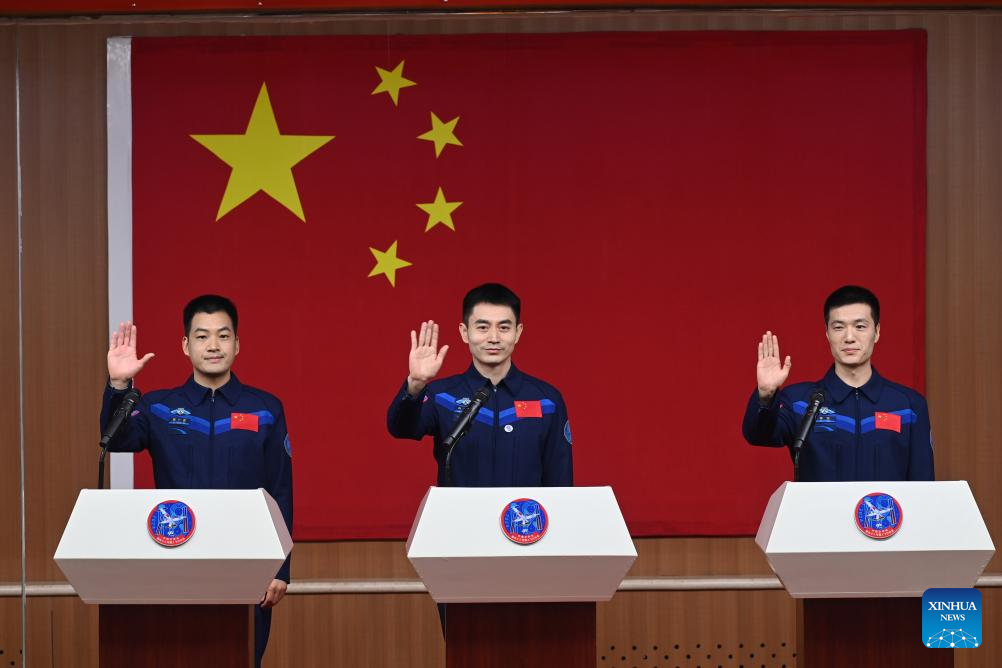
Ye Guangfu (C), Li Cong (R) and Li Guangsu, the three Chinese astronauts for the upcoming Shenzhou-18 spaceflight mission, meet the press at the Jiuquan Satellite Launch Center in northwest China, April 24, 2024. (Photo by Wang Jiangbo/Xinhua)
JIUQUAN, April 24 (Xinhua) -- Chinese astronauts Ye Guangfu, Li Cong and Li Guangsu will carry out the Shenzhou-18 crewed spaceflight mission, and Ye will be the commander, the China Manned Space Agency (CMSA) announced at a press conference on Wednesday.
The Shenzhou-18 crewed spaceship will be launched at 8:59 p.m. Thursday (Beijing Time) from the Jiuquan Satellite Launch Center in northwest China, said Lin Xiqiang, deputy director of the CMSA.
After entering orbit, the Shenzhou-18 spaceship will perform a fast automated rendezvous and docking with the radial port of the space station core module Tianhe, which will take about 6.5 hours, forming a combination of three modules and three spacecraft, Lin said.
This will be the second space flight mission for Ye Guangfu who was a crew member of the Shenzhou-13 mission from October 2021 to April 2022. Li Cong and Li Guangsu, among the third batch of Chinese astronauts, are both newcomers to space.
All the three Shenzhou-18 astronauts are the post-1980s generation.
"My two crew members and I, as well as the entire space mission team, are fully prepared and confident (in our ability) to complete this space flight mission," said Ye when meeting the press on Wednesday.
The crew will stay in orbit for about six months, and they will witness the arrival of the Tianzhou-8 cargo craft and Shenzhou-19 crewed spaceship during their stay, Lin said.
The crew will utilize the scientific experiment cabinets and extravehicular payloads to carry out more than 90 experiments in the fields of basic physics in microgravity, space material science, space life science, space medicine and space technology, Lin said.
The country's first in-orbit aquatic ecological research project will also be implemented during the mission. Using zebrafish and goldfish algae to establish a self-cycling aquatic ecosystem in orbit, the project aims to make to a breakthrough in the cultivation of vertebrates in space, Lin noted.
The world's first in-orbit stem cell study on the plant's stem tips will be made to explore plant evolutionary adaptation to gravity and provide theoretical support for space cropping, said Lin.
The Shenzhou-18 astronauts will carry out two to three extravehicular activities (EVAs), implement six cargo outbound deliveries via the station's cargo airlock module.
During the EVAs, the astronauts will install space debris protection reinforcements for extravehicular piping, cables and critical equipment, and carry out extravehicular inspections, as appropriate, to further ensure the safety of the space station, Lin said.
The Shenzhou-18 crew are scheduled to return to the Dongfeng landing site in north China's Inner Mongolia Autonomous Region in late October this year. ■



